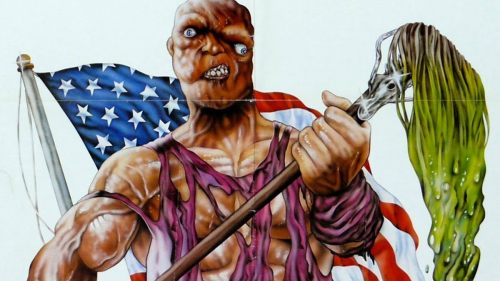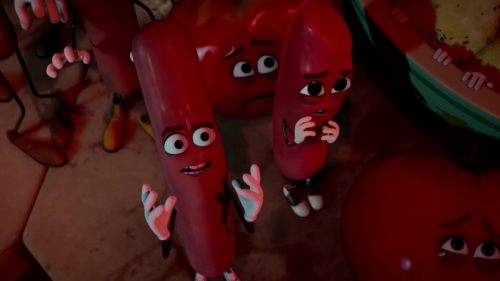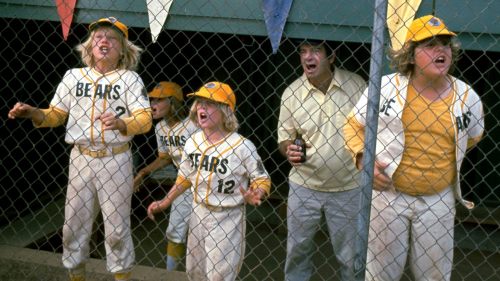G-Spot Rocks The G-Spot: The Controversy And Cancellation Of Lord & Miller’s CLONE HIGH
In honor of Sausage Party, which you can buy tickets for here, we’re launching a week of articles focused on raunchy films (an in this case TV shows!) in genres and formats typically reserved for youngsters.
Long before they proved just how awesome Lego and rebooted ‘80s cop shows could be, writer-director super-duo Phil Lord and Chris Miller served up a very different, but equally oddball, offering in the form of the ruthlessly sharp, and consistently hilarious Clone High.
Broadcast by MTV (who else?) in 2002, Clone High ran for just one season, encompassing thirteen episodes total. Reportedly brainstormed by Lord and Miller when they were just out of college, the show may have been cut off in its prime but endures today as an early example of their burgeoning creative talents.
The action takes place in the town of Exclamation! USA, where a high school filled with now-teenage clones of historical figures deals with usual teen drama, as well as a megalomaniac principal whose dodgy dealings are overseen by the very literally-named Secret Board Of Shadowy Figures.
Ostensibly, Clone High seems harmless enough, its narrative replete with PG jokes about Mr Sheepman, the first mostly human clone (voiced by none other than Andy Dick), or Joan Of Arc's surname being 'Of Arc'. There's a Jack Black rock opera episode. Marilyn Manson sings a country song about the food pyramid. And Michael J. Fox plays a kidney, in a laugh-out-loud example of that bizarre, can't-put-your-finger-on-why-it-works-so-well Miller-Lord sense of humour.
And yet, darkness is weaved into the story, too. Aside from Principal Scudworth's dastardly plan to maroon the clones on his imaginatively-titled Cloney Island, Clone High dabbles with jokes about prostitution ("starting to smell like a day-old hooker") and prison rape. There's also a particularly gruesome death by litter; blood, gore and violence feature prominently.
None of this really goes any way toward explaining why the show wasn't renewed for a second season, though. The pilot alone is a master-class in bizarre, off-kilter adult comedy and storytelling - the kind South Park used to specialize in before it got too political.
The characters are so finely drawn it's difficult to pick a favourite, even among supporting players like the Elvis twins or Van Gogh. The soundtrack is equal parts Dawson's Creek and American Pie – ideal for a show focused on teenagers, even if they are the cloned mutant variety. The hit rate of jokes matches, if not exceeds, The Lego Movie and the Jump Street films.
And the whole thing has a sweet, knowing innocence to it, with its (purposefully) rudimentary animation and repetitive messages about how each installment is “a very special episode of Clone High”. The show's creators contribute voices themselves, with the rest supplied by a combination of interesting, then up-and-coming talents, including nearly the entire cast of Scrubs (Neil Flynn, Zach Braff, Sarah Chalke and Donald Faison all make an appearance).
The controversy that would subsequently lead to the show not being picked up for a second season came as a result of its problematic representation of Gandhi. Portrayed as a hard-partying, leery, obnoxious screw-up (so terrible he thinks the infamous pie-fucking scene in American Pie is hilarious), teen clone Gandhi is a hugely annoying (and endlessly entertaining) character, but hardly an isolated case.
It wasn't simply his inclusion in Clone High that got Lord and Miller into trouble, however. Rather, it was a Maxim article in which Gandhi was shown being beaten up by a muscular man, an image search for which (along with an isolated news story in the local media) led angry citizens to stumble upon the show. In what now seems like a major overreaction – especially given Clone High didn't even air in India – around 150 protestors gathered in New Delhi, on the 55th anniversary of Gandhi's death, pledging to fast as a response to the show's depiction of him.
Miller later recalled that there were even threats to revoke MTV's broadcasting license in India if the show wasn't immediately taken off the air (again, it didn't ever run there). An apology from the network did nothing to soften the blow and when the question of a second season came up Lord and Miller were asked to remove Gandhi from the narrative entirely.
It's a real shame, not least because Clone High is an incomparably funny and original slice of adult entertainment, but Gandhi arguably has the best character arc of out of anyone on the show - particularly given the ending, which sets up a cliff-hanger which now feels hollow and unsatisfying. Gandhi, for all his faults, essentially learns his lesson over the show's thirteen-episode life-span and emerges a better, more mature, well-rounded person by the end.
Of the core group; JFK is basically the same rotten guy, Cleopatra may be snubbed but she's still a vacuous, narcissistic mean girl, Joan has given in to her baser desires and Abe, after an entire season, realizes who he really wants to be with only to discover it's too late. Only Gandhi emerges from season one with anything resembling growth, and the idea of cutting him out of further incarnations of the show seems almost as cruel as cancelling it outright.
For their part, Lord and Miller came up with two options for their sophomore, potentially Gandhi-less, season - one which didn't acknowledge his absence at all, and another in which his character was revealed to actually be a clone of Gary Coleman. Neither went over particularly well with the studio heads and the show was dropped, its existence as a near-perfect, solo season solidified forever.
In promotional interviews for The Lego Movie, and later 22 Jump Street, the two jokingly claimed their whole careers had been built around trying to get Clone High back on the air, and that the potential for a film adaptation was still there. But it’s weird to think of the endlessly quotable cult show existing in another format, let alone getting a second chance to cause more trouble.



